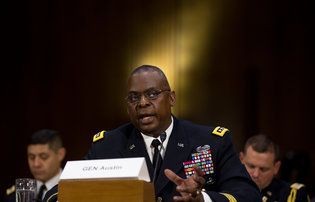PBS: Escaping Eritrea … [Read More...] about ካብ ውሽጢ ቤት ማእሰርታት ኤርትራ
The Elusive Truth About War on ISIS
During the wars in Iraq and Afghanistan, American military officials often provided misleadingly upbeat assessments of battlefield efforts and belittled reporting that contradicted their narrative. Their take on the progress of the troops was frequently at odds with the conclusions of civilian intelligence analysts and reporting by journalists in the field. The opposing views were important because they sometimes forced the Pentagon to face unpleasant truths and change course.
The war against the Islamic State terrorist group, which the Obama administration launched more than a year ago, however, has unfolded out of sight by design.

Press releases summarizing the actions of the American-led coalition include the vague dateline “SOUTHWEST ASIA,” because the task force leading the effort doesn’t publicly acknowledge it is based in Kuwait. The American military’s Central Command, or Centcom, which oversees the air campaign, periodically releases grainy black-and-white videos showing bombs blasting buildings and other targets into smithereens. But basic facts like the number of civilians killed in airstrikes, the strength of the Islamic State and the extent to which the international coalition’s strategy might be having a radicalizing effect have remained disturbingly elusive.
That makes the reported attempts by senior military officials to alter the conclusions of rank-and-file intelligence officers particularly alarming. The Defense Department’s inspector general is investigating whether senior Centcom officials have sought to distort the assessments of military intelligence analysts to paint a positive picture of the war on the Islamic State, also known as ISIS. Those assessments are considered along with others produced by civilian agencies; conclusions from various assessments are then distilled and presented to the president and top policy makers.
Gen. Lloyd Austin, the commander of Centcom, said in testimony before the Senate Armed Services Committee on Wednesday that he would take “appropriate actions,” once the inspector general’s office concludes its investigation. He told lawmakers that despite some setbacks, “progress is being made” in the military campaign. But his startling responses to questions from senators offered no reason to believe that is true.
He said, for instance, that the United States currently has “four or five” Syrian fighters battling the Islamic State — more than a year into a campaign that depends heavily on grooming and training a local fighting force. ISIS, a Sunni group, which aspires to establish a caliphate, now maintains control of terrain in northern and eastern Syria, as well as Mosul and Ramadi, two important Iraqi cities.
Senator John McCain called the military’s assessment of progress “divorced” from reality and described the status quo in Syria as “an abject failure.” Those characterizations certainly ring true. But Republicans can’t be allowed to place the blame on the Obama administration, as Mr. McCain appeared to do by asserting: “This is a result of leaving Iraq.” This specious attack may well be used by Republicans in the presidential campaign. Of course, they are unlikely to mention that it was President Bush who negotiated the withdrawals of American troops from Iraq.
For more than a year, Congress has failed to exercise its power to authorize the war against the Islamic State. That has given the Obama administration free rein to escalate the military campaign with virtually no oversight or guidance from Congress. Lawmakers should demand that the military be forthright in its assessments, but their criticisms ring hollow when they dodge all responsibility for setting war policy.
